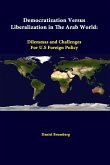Regime change during the Arab Spring allowed Islamist political forces that long had been marginalized to achieve political influence in Tunisia, Egypt, and Libya. Meanwhile, Morocco's first government led by an Islamist party has been in power since January 2012. This trend caused widespread concern over the future direction of these states; but despite the tragic example of Egypt, few negative predictions have yet been borne out. In this monograph, Dr. El-Katiri, a British analyst with many years of experience in reporting on the Middle East and North Africa, cautions against an overly simplistic assessment of this rise in the influence and power of political Islam. He uses an extensive range of source material to show that the political crises besetting each of these Islamist governments are not necessarily of their own making, but instead are determined by objective circumstances. He also describes how in several key respects the aims of Islamist parties are in line with U.S. aspirations for the region.
Hinweis: Dieser Artikel kann nur an eine deutsche Lieferadresse ausgeliefert werden.
Hinweis: Dieser Artikel kann nur an eine deutsche Lieferadresse ausgeliefert werden.








